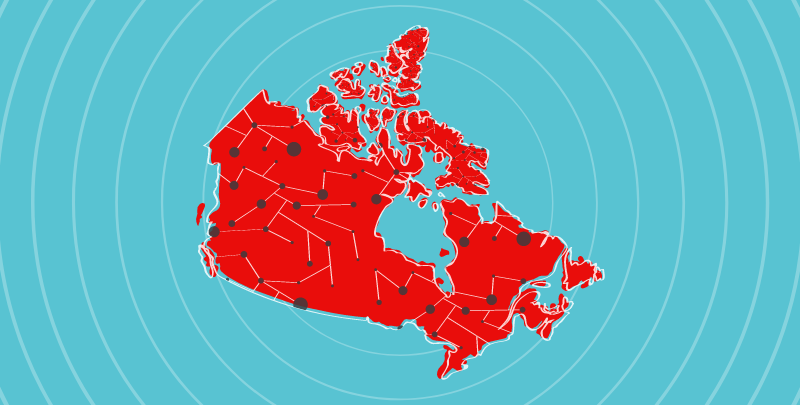[Ottawa, ON]
CANARIE today announced the completion of a number of projects that increase the capacity and reliability of the National Research and Education Network (NREN). These projects are part of a nearly $5.8 million investment made by CANARIE, via federal investment by Innovation, Science and Economic Development Canada (ISED), and its provincial and territorial partners in the NREN.
Through these projects, students and researchers at research and post-secondary institutions will benefit from new or enhanced connections to the NREN. These connections enable ultra-high-speed access to colleagues, research instruments, services, and data across Canada and around the world. Canada’s NREN connects over 750 post-secondary institutions, hospitals, research facilities, government departments, and innovation centres to thousands of similar institutions worldwide through a global web of over 100 NRENs.
“Canada’s NREN Partners work together to strengthen and grow the essential services that support top-tier research, education, and innovation nationwide,” says Chad Coller, President and CEO of SRNET and Chair of the NREN Governance Committee. “This coast-to-coast-to-coast collaboration not only boosts efficiency but helps keep Canada at the forefront of science and technology.”
“Canada’s NREN Partners are driving research and innovation forward in every sector across the country,” says Kathryn Anthonisen, President and CEO of CANARIE. “By constantly improving our digital infrastructure, we help keep Canada at the forefront of global research and innovation. We’re proud to support projects that showcase the power of collaboration in the NREN community.”
In Alberta, Cybera undertook four projects that enhanced network capacity and reliability. In Edmonton, significant upgrades increased capacity for future traffic and growth, benefiting more than 100 organizations and 770,000 users. In central Alberta, Cybera added a backup connection for its members – including Red Deer Polytechnic, which focuses on applied research in healthcare and energy innovation – that will prevent loss of connectivity during network outages. In Edmonton, further equipment upgrades now support the growing demands of 11 institutions in the area. Additionally, Ambrose University is now connected to the NREN through a new fibre link, enabling its more than 1,000 staff and students to connect with national peers and benefit from NREN-supported cybersecurity services.
In British Columbia, BCNET enhanced the resiliency of their network through two projects, improving access to high-performance computing resources like the Digital Research Alliance of Canada site at the University of Victoria’s Arbutus high-performance compute cluster. BCNET also increased redundancy and diversity in their network’s traffic transportation, which will prevent outages and improve connectivity for over 100,000 students and researchers, particularly those involved in research and Indigenous-focused programs. Additionally, Native Education College (NEC) is now connected to the NREN, allowing it to expand its educational programming and connect with more Indigenous students and researchers. Through partnerships with First Nations, Métis, and Indigenous communities, NEC delivers accredited post-secondary and adult upgrading programs across British Columbia, providing a culturally authentic, holistic learning environment that honors traditions, worldviews, and pedagogies.
In Manitoba, MRnet undertook two projects to upgrade their network’s infrastructure, which increased network capacity, reduced costs, and simplified network operations. In addition to improving the overall performance and functionality of MRnet’s network, these upgrades allow their members to use advanced applications requiring high bandwidth and low latency in several research and education disciplines.
In New Brunswick, ECN-NB added 100G capacity between major cities across the province. In addition to increasing connectivity, they also implemented changes that provide automatic failover to alternative paths for all services, enabling reliable connectivity for their members.
In Nova Scotia, ACORN-NS’s two projects focused on network infrastructure upgrades to improve network capacity, connectivity, and resiliency for 11 universities and the 17 community locations of Nova Scotia Community College. ACORN-NS members can also now access 100G connections through the CANARIE backbone network, enhancing data transfer speeds and enabling seamless research collaborations within the province and across Canada. A strong and resilient network supports the creation of a new medical school campus at Cape Breton University, in partnership with Dalhousie Medical School, and a new Healthcare Data Analytics Program at Saint Mary’s University in collaboration with the Nova Scotia Community College.
In Ontario, ORION has completed six projects that have significantly enhanced their network infrastructure by upgrading core network components with modern, high-capacity alternatives to diversify network segments and reduce troubleshooting time. The upgrades improve reliability, security, and performance as well as increase resiliency, redundancy, and capacity. The enhancements not only support current research and education traffic but also enable future growth, providing increased connectivity to over 100 ORION member institutions across the province. This ensures that ORION’s network remains robust and reliable, fostering greater collaboration and innovation within the community.
In Quebec, RISQ undertook six projects to upgrade the capacity and performance of their network, meeting the evolving needs of research and educational institutions across the province. These projects involved equipment upgrades to increase network reliability and security, with RISQ members also now benefiting from The CANARIE backbone network with 100G and 200G connectivity. For example, a new 100G connection between Laval University and Montmorency Forest now allows for more research activity within the forest, empowering students and researchers studying and combatting climate change, while also facilitating the exchange of research data across Canada and internationally. RISQ also established a new fibre presence within Montreal West Island, which significantly reduces service costs, and increases network reliability and service to multiple institutions, students, researchers, and faculty across campuses.
In Saskatchewan, SRNET led two network infrastructure upgrade projects in Saskatoon and Regina that significantly increased network capacity and reduced maintenance costs. SRNET members, including the Universities of Saskatchewan and Regina, are now also benefitting from a 100G connection to CANARIE’s backbone network.
For more information, please contact:
Lesley McElroy
Director, Communications
CANARIE
lesley.mcelroy@canarie.ca


